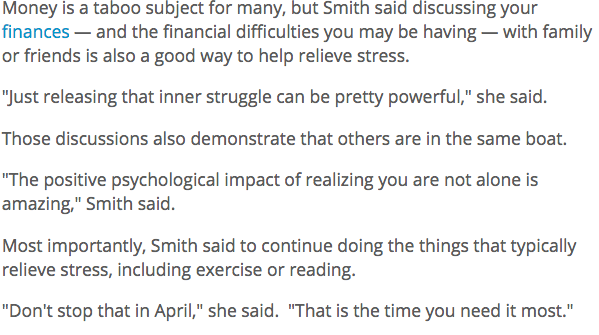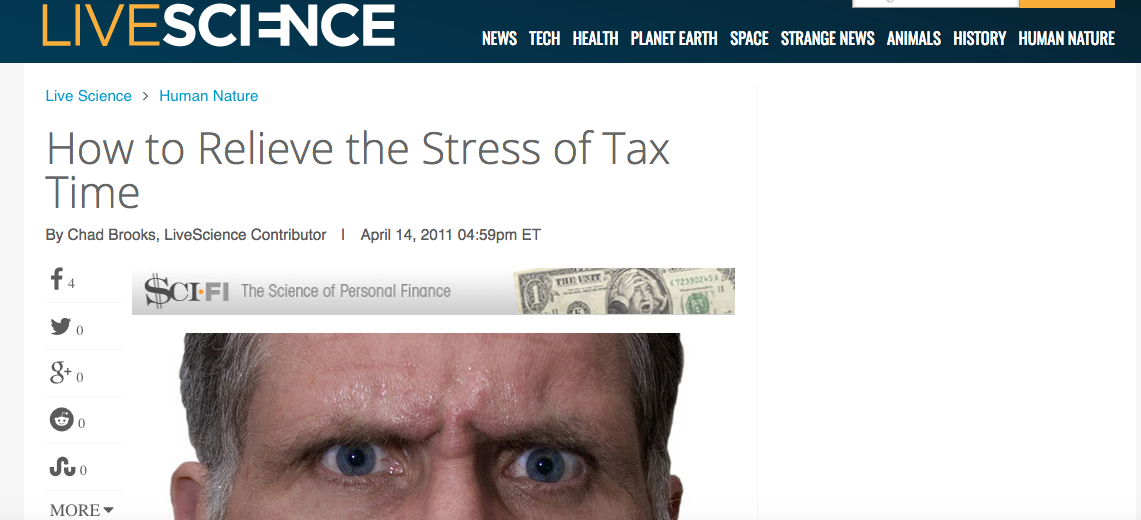Several years ago when the economy went downhill (yes, an understatement, I know) psychologists like me were getting lots of questions about how to cope with the stress. I was interviewed by the Wall Street Journal, National Public Radio, and the Philadelphia Inquirer – and every reporter had the same basic question: “How do we cope with financial strain and keep our mental health at the same time?” Some of the tips I often gave were things like:
- Turn off the TV/radio/computer so as not to be bombarded by the bad news
- Take action by making small changes in your financial life
- Don’t forget to keep up the healthy stress management strategies you already have in place (i.e., walking, talking with friends, going to church)
But here we are 3+ years down the road and things don’t seem to have gotten much better. Sure the market may be up and interest rates may be down, but I still hear stories of layoffs, prolonged unemployment, and perpetual under-employment. I’m not sure what the exact definition of “chronic” is when it comes to stress, but I am certain we are there. The financial stressors we are facing have gone from acute to chronic – the difference may seem like semantics, but really it’s a whole different ballgame.
What makes chronic stress different than acute stress, particularly in regards to our economic lives?
Emotional health. Most of us have the emotional and psychological resources to cope with stress on a short term basis (meaning several weeks to several months). Prior to the onset of the acute stressor we were probably healthy, rested, and had at least one or two good coping strategies in place. However, after an extended period of time (3 years, for example) the chronic exposure to stress starts to take its toll on our emotional health. What was once a few nights of poor sleep has become insomnia. We’ve stopped engaging in healthy coping strategies (reading, praying, yoga) and taken on “easier,” less healthy habits (drinking too much, eating too little, watching more pornography).  Psychological health is a high maintenance thing – when we don’t care for it, it can deteriorate pretty quickly. Increased anxiety, worsening mood, irritability – these can all be signs that our mental health is being negatively affected by chronic stress.
Physical health. Did you know that chronic stress affects every system of the body? Stomachaches, headaches, muscular pain, cardiovascular disease – chronic stress can play a part in all of these conditions. Still not convinced? Take a look at the American Psychological Association’s super cool mind/body health interactive tool and see for yourself just how destructive chronic stress can be.
Hopelessness/helplessness. Researchers know that one of the most psychologically-damaging emotional states is when one feels hopeless and/or helpless about their situation in life. It is no good when we feel as if we have no agency – or say – in our lives. Unfortunately, that is exactly the feeling that this “financial downturn” has produced in many of us. It’s not infrequent for me to hear people saying things like: “But I saved, and went to school, and spent money responsibly – how can it be that I am still broke and unemployed when I did all the right things?” or “It doesn’t seem to matter what I do or try, I can’t catch a break financially.” I think it’s pretty obvious to see how this sort of thinking can be a precursor to depression.
A little bit of stress is OK, 3+ years of daily worry about money and employment can take its toll. Check in tomorrow for some tips of how to manage chronic financial stress.



